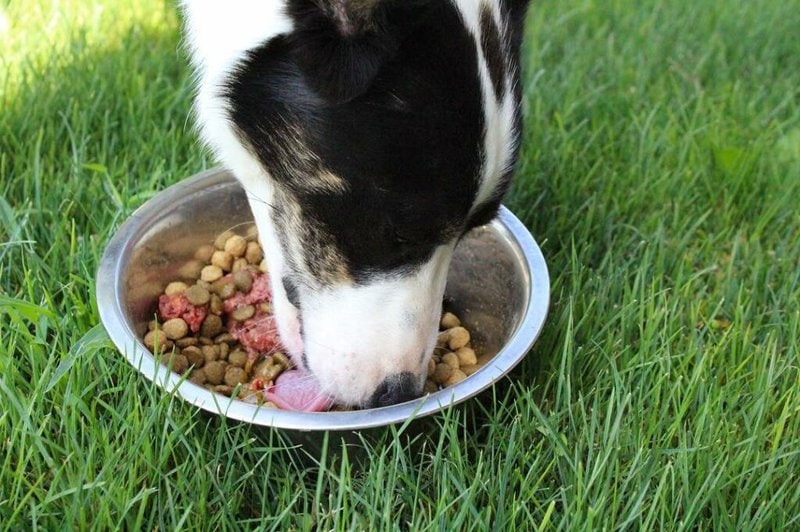Canola oil is popular because of its low cost and high production yield. Particularly in the summer, more canola oil varieties may be available because that’s when the canola plant reaches maturity. With the many low-cost canola oil options available, you may be tempted to purchase some. But consider safety first. Not all oils are suitable for doggies. So, can dogs have canola oil?
Yes, dogs can have canola oil as it is high in oleic acid, which boosts their heart health. However, due to its high caloric content, canola oil should only be served to dogs in moderate amounts occasionally. Nonetheless, this oil is not toxic or dangerous to dogs, and there are healthier oil alternatives that aren’t as heavily processed.
This article explains how canola oil is made and why we recommend limiting your doggies’ intake. We’ll also provide a list of healthy oil options that are safe for our canine friends. Finally, we cover some pros and cons of giving dogs canola oil. However, let’s first see why dogs can have canola oil only in certain situations.
Can Dogs Have Canola Oil?

Yes, dogs can have canola oil. However, dogs shouldn’t consume canola oil regularly. So, giving your furry friend canola oil should be only done occasionally if there are no other oils available.
Canola oil, usually bright yellow, comes from the seed of rapeseed plants largely cultivated in Asia, North America, and Europe. Canada, China, India, and France are the top producers of canola oil.
Many people love canola oil because it is an economical source of omega-3, omega-6, and omega-9 fatty acids. Other oil types use animal sources for their omega fatty acids, whereas canola oil uses plant sources. Consequently, the derivation of omega fatty acids from canola oil is highly economical.
Canola oil is also loved because it is high in unsaturated fatty acids (91.4%) and low in saturated acids (7.4%). Its high amount of unsaturated fatty acids, particularly oleic acid, makes canola oil ideal for heart health.
Nonetheless, there is a downside to canola oil that lies in its production. Canola oil is produced using hexane to extract oil from rapeseeds. At the end of production, a small and untraceable amount of hexane remains in the final canola oil product.
This small amount of hexane doesn’t mean canola oil is dangerous or toxic. Large amounts of hexane are toxic to humans and even more dangerous for dogs. Though canola oil contains small doses of hexane, we recommend giving your dog other oils when they’re available.
Is Canola Oil Safe For Dogs?
Yes, canola oil is technically safe and non-toxic to dogs in small amounts. But canola oil is not safe for dogs when consumed regularly. We don’t recommend regular or large doses of canola oil because of its hexane constituents, which can be harmful when taken regularly.
However, if you give dogs canola oil on rare occasions when other better oils aren’t available, that is safe. In this case, a small amount of canola oil won’t harm your furry friend.
Is Canola Meal Safe For Dogs?
Just like canola oil, a canola meal is only safe for dogs if it is not consumed regularly.
Canola meal comes from the remnants of canola seed after oil extraction. Canola meal is rich in protein, vitamins, and minerals. The proteins in the canola meal, which is about 36%, help to build your pooch’s muscles.
Its high protein content will explain why canola meal is common in many dog food products. A downside of a canola meal is its bitter taste and rancid smell, which can repel dogs.
Why Is Canola Oil Good For Dogs?
Some people consider canola oil to be good for dogs because of its benefits. For example, its high amount of unsaturated fatty acids, such as oleic acid, makes it beneficial for heart health.
But even if canola oil has a few health benefits, that doesn’t necessarily make it safe for regular consumption. So, we recommend giving dogs canola oil only occasionally if healthier oils aren’t available.
Pros Of Feeding Dogs Canola Oil
- Omega-3 and omega-6 fatty acids in canola oil help your doggie’s heart health.
- Fatty acids provide a shiny coat, prevent inflammation, and support a healthy heart.
- Canola oil is a cheap source of essential fatty acids. Unlike oil manufactured from fish, such as mackerel or salmon, canola oil is a cost-effective option manufactured from rapeseeds.
- Canola oil contains vitamin E for healthy skin and vitamin K, which is essential for healing wounds.
- Canola oil is comparatively higher in calories than other oils. One tablespoon contains 124 calories.

Cons Of Feeding Dogs Canola Oil
- Canola oil is made with hexane as an extraction solvent. Hexane isn’t safe for humans or dogs to consume in large amounts.
- Some canola oils use GMO rapeseeds during production.
- The high caloric content in canola oil puts dogs at risk for obesity if consuming it regularly. With obesity and high fat, health problems such as pancreatitis can also occur in dogs.
- During the refining process, heat and other chemicals may alter the number of final healthy nutrients left in the oil.
Can I Cook My Dog’s Food In Canola Oil?
Yes, you can cook your dog food in canola oil. However, we recommend using canola oil only if no healthier oils are available. If there are other healthy oils that are safer for doggies, you should go for them rather than canola oil.

What Cooking Oils Are Safe For Dogs?
Hence, in order to answer the query about other cooking oils considered safe for dogs to consume, we will explore a list here.
Fish Oil
Fish oil comes from the bodies of oily fish and is available in pill or liquid form. Fish oil contains two omega-3 fatty acids known as EPA (Eicosapentaenoic acid) and DHA (Docosahexaenoic acid).
A benefit of fish oil is it prevents inflammation in canines because omega-3 fatty acids have anti-inflammatory properties. Also, as a result of these anti-inflammatory properties, fish oil treats itchy skin, dandruff, hot spots, and arthritis.
The low saturated fat levels in fish oil also support sound cardiovascular health. Furthermore, it improves memory and other cognitive functions in your pooch.
Coconut Oil
Coconut oil is high in lauric acid, which helps to increase the HDL level, or “good cholesterol,” in your furry companion. So coconut oil supports good cardiovascular health.
Other benefits of coconut oil for doggies are its antimicrobial abilities. Rubbing coconut oil on your doggie’s skin results in healthy skin and fur that does not itch and is free of flakes.
Avocado Oil
Avocado oil comes from the fleshy pulp of avocado fruit. This oil is very high in unsaturated fatty acid (70.6%), containing about (58%) oleic acid. Oleic acid is a good source of omega-3 fatty acids. Apart from these fatty acids, avocado oil also contains vitamin E.
There are many benefits of avocado oils for dogs. It supports heart health, prevents inflammation, and helps with the absorption of carotenoids and other nutrients in the body. When applied externally to doggies’ skin, avocado oil keeps their skin moisturized and non-itchy and removes old skin cells. Also, it keeps their hair shiny.
Olive Oil
Olive oils are popular, and one of the few oils recommended for doggies without counterclaims. It is rich in oleic acid, a monounsaturated acid that helps lower blood LDL levels. A lowered LDL level reduces the risk of atherosclerosis. So, olive oil is safe for the heart of your furry friend.
We recommend you get your furry friend 100% olive oil, as it is the best one. Benefits of olive oil include shiny coats, better immune systems, and improved cardiovascular health. Since olive oil doesn’t contain omega-3 fatty acids, it is a suitable alternative for very young pups unable to digest omega-3 fatty acids from fish oil.

Sunflower Oil
Sunflower oil contains a high percentage of linoleic and oleic acids. It also has a very high amount of vitamin E and a moderate amount of vitamin K.
Because sunflower oil has a high amount of vitamin E, it helps provide a healthy coat and skin when applied externally. When part of your doggie’s diet, sunflower oil also provides omega-3 fatty acids, preventing inflammation.
Is Olive Or Canola Oil Better For Dogs?
When choosing between olive and canola oil, we recommend choosing olive oil. Olive oil is more suitable because it is mainly manufactured by cold-pressing and without a solvent.
Cold-pressing involves the direct use of machines to press the fruits of olive and extract oil. This process differs from the manufacturing process for canola oil, which washes seeds in hexane to extract oil. For this reason, olive oil contains no extraction solvent, making it healthier than canola oil.
Olive oil provides another nutritional benefit that canola oil doesn’t. Olive oil is relatively higher in linoleic acid than canola oil. Olive oil is 75% linoleic acid, while canola oil is 61% linoleic acid. In the body, linoleic acid helps make prostaglandins, a precursor to many anti-inflammatory chemicals in your pooch.





